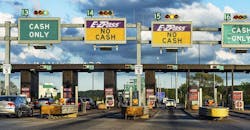Fuel taxes are obsolete, interstate per-mile tolling is the answer: report
Tolling the interstates is a hard sell and Bob Poole knows it. He also believes that unless we move away from a fuel tax system to fund highway repairs, improvements, and maintenance that the roads will be in worse shape than they are now and the further crumbling of the country's infrastructure will hurt the trucking industry.
Using figures in research that he offered in The Case for Toll-Financed Interstate Replacement, a report he authored for the Reason Foundation, Poole estimates: "By 2040 fuel tax revenue would be half what it is today absent any increases that would be legislated."
The Reason Foundation is a non-partisan, libertarian think-tank. "This means limited government and free markets," Poole, director of transportation studies, said. "We’re not political at all."
Even if fuel taxes were raised, they could not pay for a much-needed modern highway system.
He realizes that changing from a fuel tax to distance-based financing, which would be collected electronically, is a shocking and scary proposition for many highway users and politicians because it will cost more to drive despite the increased benefits.
"One of the reasons [our interstates are in poor condition] is that the current fuel taxes are not enough to properly pay for improving and maintaining them,” Poole said. “What the fuel tax does is basically charge the same rate for any kind of use. A truck pays about the same whether it's on a country road, or making a delivery to a distribution center in an urban area, so it’s paying an average price through fuel taxes to use and pay for the infrastructure. That shortchanges the expensive facilities and overcharges on the inexpensive facilities.
“One of the reasons we have the interstates in such bad shape is that the existing fuel tax is not sufficient to fund it,” he said. “Part of the reality check is that we’re going to have to pay more per mile. Everybody who uses rebuilt interstates is going to have to be paying more per mile than they have historically paid because there's not enough funding to do the job."
Part of selling this idea, aside from changing the 1956 law that prohibits tolling on interstates, is for industry stakeholders to appreciate that tolling is a value proposition, that having better roads will be safer, carry more freight, offer drivers more amenities like increased parking and up-to-date service centers. Most important, unlike fuel taxes which can be diverted for non-highway spending, tolling revenue must, by statute, be spent only on highway improvements. While the gradual, multi-year switch from fuel taxes to toll-based funding is underway there will be (fuel tax) rebates to users, Poole said. "I focus on what would be a policy of no double-taxation and minimize or forbid revenue diversion to non-interstate uses. That’s going to be a very strict feature."
Poole also sees the transition to a toll-funded system as sort of an 'improve as you go' structure. "This would be a very gradual transition,” he said. “As each corridor gets rebuilt, tolls would go on and then rebates would be paid on the fuel tax just for the miles driven on those newly-tolled corridors. You’re talking about a 20-year or more program to gradually rebuild the interstates. The tradeoff for state DOT's is they will not have to come up with the money for the capital costs of rebuilding that corridor. Maintenance is built-in contractually to come out of the toll revenue."
Poole adds: "One of the things I learned with traffic revenue studies is that historical experience shows that the higher the toll rate the more traffic diversion there is. One of the reasons that toll revenue must be limited by law to only the capital operating cost of the rebuilt interstates is to keep the rates as low as possible to minimize traffic diversion."
In addition, in-state and out-of-state vehicles would pay the same as would all vehicles whether they're trucks or cars.
The report also suggests that truck-only lanes on some interstates could be a feature not only for safety but to haul more freight. "Those corridors that had the highest projected truck traffic ought to have dedicated truck lanes, and we have identified them,” Poole said. “Many were multistate, like I-70, across a number of states. From our knowledge of trucking patterns, I think I-35 north/south and parts of I-75 north/south and I-81 through Virginia, Pennsylvania and so forth. These lanes could offer the benefits of having longer combination vehicles in a much wider, much broader part of the interstate system. You could make a very strong safety case that in barrier-separated lanes the arguments that the safety groups and the railroads make against turnpike doubles and triples just go away."
The proposal could help expand service plazas, Poole says: "I think real service plazas, with lots more safe, overnight parking space with electric hookups right on the interstate is possible… hydrogen refueling or electric vehicle recharging... whatever you need. You’re looking at a system for the next 50 or 60 years, and it’s time to think outside the box about what trucking will look like in 20 or 30 years and what it will need. This nonsense that you can’t have commercial services at interstate rest areas is just BS. And it really could be a huge opportunity for the truck stop industry to do a big part of many of these new rest areas."
About the Author

Larry Kahaner
Larry Kahaner is an author, journalist, and former FleetOwner contributor.

